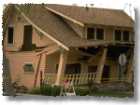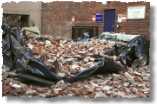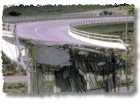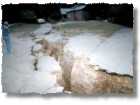
 Earthquakes - surprise disasters
Earthquakes - surprise disasters
Some natural disasters, such as storms and floods are predicted and you have time to plan. Earthquakes are sudden, give no warning, and are deadly so you need to be ready well before one occurs in order to find safety. Everyone in your family needs to know what to do in an earthquake no matter where they are - at work, school, home, in the car, at a friend's house. Develop your earthquake preparedness now and be ready by keeping these tips and information in mind.
California is well-known for its earthquakes but the ground shakes pretty much everywhere. Chances of a damaging quake are certainly higher in some states and so low in others that the effort to prepare for them would most likely be wasted. Evaluate your location to determine how much risk you have and plan your safety based on the information you have.
 Before the Quake
Before the Quake
- Know where your utility shut-offs are and how to operate them - gas, electric, water. Teach all family members what to do. About 25% of fires after an earthquake result from natural gas leaks.
- Define a phone number to call so your family can tell that everyone is safe from the earthquake. One family member's cell phone number or out of town relative.
- Define a meeting place for all family members if phones do not work.
- Get trained in first aid so you can help your family and neighbors.
- Know where your nearest police, fire, and medical facilities are and the best routes to them.
- Discuss earthquake preparedness with your neighbors to help them prepare and know that you will help them.
- Maintain a 72 hour emergency kit as your earthquake survival kit.
- Maintain emergency food and emergency water supplies.
- Prepare your home for a quake:
- Strengthen your house foundation.
- Brace load-bearing walls.
- Anchor house to foundation.
- Reinforce your chimney.
- Brace your water heater.
- Use flexible gas connector pipes on all gas appliances.
- Anchor large appliances and furniture to walls with flexible anchors.
- Attach TVs and other large items to the shelves on which they rest.
- Install latches on all cabinet doors, especially in the kitchen.
- Move heavy pictures, mirrors, art away from couches, beds, and places where people may sit.
- If inside, duck under sturdy furniture, cover your head with your arms, and hold on to the furniture until the quake ends.
- A hallway or an inside wall is a safer place.
- Get out of the kitchen and away from windows, tall furniture, and fireplaces to minimize danger of things falling on you.
- If you are outside, get to open land away from buildings, trees, power poles and things that might fall.
- If you are driving, stop quickly but safely out in the open. Do not stop on or under bridges or raised highways, by power poles or anything that may fall on you.
- Retrieve your firstaid kit and administer first aid to those in need. See First Aid Dude for details and info.
- Check for hazardous situations around your home and fix those you can:
- Fires - put out ones you can and call for help.
- Electric - turn off main power breaker if it appears there is damaged wiring.
- Gas - if you smell a gas leak, turn off the main gas valve.
- Structure - inspect walls, chimneys, large furniture.
- Spills - clean up gasonline, paint, bleach, and other dangerous liquids.
- Unstable Items - carefully open pantry doors, medicine cabinets, and other places where items may fall out.
- Expect aftershocks to occur. Be ready for more tremors and get to a safe place.
- Check your earthquake survival kit and emergency food and water supplies. Move them if they are in an unsafe location.
- Put on sturdy shoes and protective clothes, even inside your house, because of broken glass and debris.
- If you are in a coastal location, prepare for a tsunami emergency.
- If you decide to evacuate, take your 72-hour earth quake kit, pack up, and leave. Travel by car may not be possible if roads are heavily damaged.
- Listen to the radio for earthquake information updates and instructions.
 During the Quake
During the Quake
 After the Quake
After the Quake
Earth quake preparedness is important to understand, even if you live in an earthquake-safe area. When you travel to other places, being ready by following these earthquake safety tips may come in handy.

Find Emergency and Disaster Info at www.EmergencyDude.com

